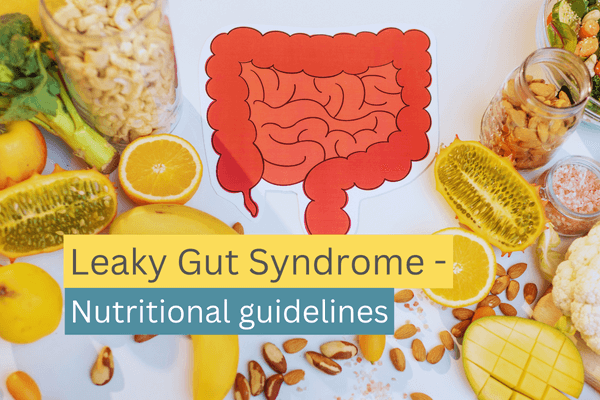
Leaky Gut Syndrome Diet – Tips & Strategies
In this patient information, we would like to give you an overview of the importance of a proper leaky gut syndrome diet.
Leaky gut syndrome is a condition in which the intestinal barrier is compromised and there is increased permeability of the intestinal wall. This can lead to various health problems as undigested food components, toxins and bacteria can enter the bloodstream.
If you would first like to learn more about the causes and symptoms of leaky gut syndrome, then please read our detailed article on leaky gut syndrome.
Table of contents
Leaky Gut Syndrome Diet – Strategies
In my practice and according to my therapy concept, a targeted nutritional intervention is an essential therapy pillar to treat Leaky Gut Syndrome. Without nutritional intervention, success of other therapies to improve the intestinal barrier is often not given.
Following are some recommendations that can help you support your gut health:
1. Reduce foods that promote inflammation
Foods rich in refined sugars, saturated fats and processed foods can increase inflammation in the gut. It is advisable to stop consuming foods that contain refined sugar, fried foods, convenience foods, and industrially processed foods in general. This can also significantly reduce exposure to food dyes and food additives.
2. Promote a diet rich in fiber
Dietary fiber is essential for intestinal health. They support intestinal flora, promote digestion and contribute to the regulation of intestinal movements. Favor whole grains, vegetables, fruits, legumes and nuts to increase your fiber intake.
If, of course, at the same time a bacterial overgrowth of the small intestine (SIBO) or strong fermentation of food in the small intestine is present, a high-fiber diet could lead to an increase in gas formation in the intestine and/or air accumulation. In this case, a low-FODMAP diet for 4-6 weeks is useful. This must be clarified on an individual basis. Small intestinal bacterial overgrowth (SIBO) is diagnosed by a breath test. You can find more information here >> What is SIBO? (Includes a free downloadable FODMAP list).
3. Pay attention to good sources of fat
Healthy fats, such as omega-3 fatty acids found in fish, flaxseed and walnuts, may have anti-inflammatory properties and help repair the intestinal barrier.
4. Avoid potential allergens
Certain foods can trigger allergies or intolerances or trigger leaky gut and exacerbate the symptoms of leaky gut syndrome. The most common allergens include gluten (in wheat, barley, rye), dairy products, soy and certain nuts. There does not have to be celiac disease present for this. In many cases, it can be helpful to strictly avoid these foods for 3-4 months. I recommend avoiding gluten (which can directly trigger leaky gut via the chemokine 3 receptor) and dairy products of any kind in the presence of leaky gut syndrome. This has become an important pillar in my therapy.
5. Support the intestinal flora with probiotics and short-chain fatty acids (butyrates).
Probiotics are live microorganisms that can promote healthy intestinal flora. I have reported on this in detail in my newsletter >> Treatment options – Leaky Gut Syndrome
6. Pay attention to food additives
Some food additives and chemicals can affect gut health. Try to avoid foods with artificial flavors, colors and preservatives.
7. Do not forget to hydrate
Adequate hydration is important for proper digestion and transport of nutrients in the body. Drink enough water and avoid excessive alcohol and caffeine consumption.
8. Individual strategies
Every body reacts differently to certain foods. If you get reproducible discomfort after certain foods, please omit them.
Leaky Gut Syndrome Diet – Conclusion
In conclusion, it is important to emphasize that following a certain leaky gut syndrom diet is only one aspect of treating leaky gut syndrome. A combination of several therapies is always necessary to achieve success.
Please note that this information only provides an overview of the subject and cannot replace medical advice.
We hope this information will help you better understand the importance of nutrition in leaky gut syndrome. Your health is close to our hearts.
For further information, please do not hesitate to contact us. Feel free to contact us anytime and arrange an appointment if you have any questions.
Stay healthy and informed!
Dr. Stefan Rohrer
More articles on the topic of chronic gastrointestinal problems:
– Leaky Gut Syndrome – Causes, Symptoms, Diagnosis and Treatment Options.
– What is SIBO – Small Intestinal Bacterial Overgrowth? What to do?
– What does a SIBO nutrition plan look like?
– What is irritable bowel syndrome? What to do?
– More information about intestinal parasitoses
